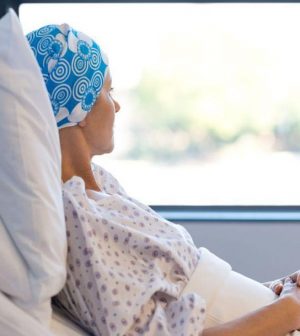- Could Your Grocery Store Meat Be Causing Recurring UTIs?
- Are You Making This Expensive Thermostat Error This Winter?
- Recognizing the Signs of Hypothyroidism
- 10 Strategies to Overcome Insomnia
- Could Artificial Sweeteners Be Aging the Brain Faster?
- Techniques for Soothing Your Nervous System
- Does the Water in Your House Smell Funny? Here’s Why
- Can a Daily Dose of Apple Cider Vinegar Actually Aid Weight Loss?
- 6 Health Beverages That Can Actually Spike Your Blood Sugar
- Treatment Options for Social Anxiety Disorder
High-Tech Screening Might Spot More Cancer Patients Who’d Benefit From Immunotherapy

More patients could benefit from immunotherapy, a highly effective treatment for some cancers, new research suggests.
Revising current testing guidelines so that a more sophisticated test could be used more often would enable 6,000 more people in the United States to receive the treatment, a team from Brigham and Women’s Hospital in Boston contend.
Immunotherapy is highly effective for those whose cancers have mismatch repair deficiency — in which errors in DNA occur due to a lack of certain proteins. This impairs DNA’s ability to repair itself and can lead to many types of cancer, the researchers pointed out.
“In colorectal cancer and endometrial cancer, which are the two types of cancer where mismatch repair deficiency is most commonly seen, immunotherapy is not the standard treatment unless a patient has this condition,” study author Dr. Elias Bou Farhat, a postdoctoral research fellow in Brigham’s Division of Pulmonary and Clinical Care Medicine, said in a hospital news release. “But in patients with this condition, even in late-stage cancer, those who receive immunotherapy can live for years and in some cases be potentially cured.”
Previous research has shown that patients with mismatch repair deficiency typically do well with immunotherapy, which uses a person’s own immune system to fight cancer. But some of these patients are missed in testing.
This study looked at 1,655 patients with either colon or endometrial cancer who received current lab testing (immunohistochemistry) for the deficiency as well as next-generation sequencing.
Current lab tests missed nearly 6% of patients with endometrial cancer and 1% of those with colon cancer who had the deficiency. But next-generation sequencing detected the deficiency in these cases, the study found.
Because next-generation sequencing looks for more genetic mutation characteristics, the researchers said it is a more sensitive test. Still, they said further studies are needed to confirm and generalize the findings.
The data also showed that in patients with the same cancer at the same stage, those who did not receive immunotherapy had worse outcomes.
The findings were published Dec. 28 in the journal Cell.
“Including next-generation sequencing as a complimentary testing practice could benefit patients in all phases of cancer, from pre-treatment to advanced stages,” Farhat said.
More than 150,000 Americans are diagnosed with colon cancer and more than 65,000 with endometrial cancer each year.
“We don’t want to miss these patients, or we could be depriving them of a treatment that can have long-term benefits,” said senior study author Dr. Amin Nassar, a member of Yale Cancer Center who did the work as a resident at Brigham and Women’s Hospital. “We also want to avoid giving patients treatments that could be more toxic and/or less effective — we want to treat patients with the appropriate therapy.”
More information
The American Cancer Society has more about immunotherapy.
SOURCE: Brigham and Women’s Hospital, news release, Dec. 28, 2023
Source: HealthDay
Copyright © 2026 HealthDay. All rights reserved.










